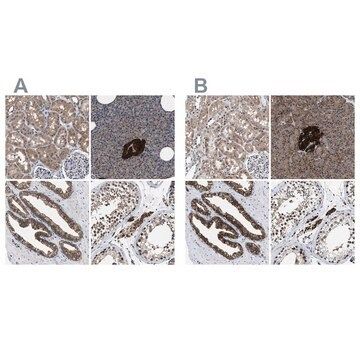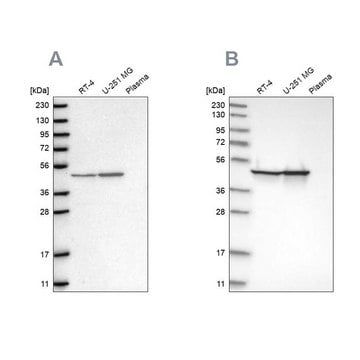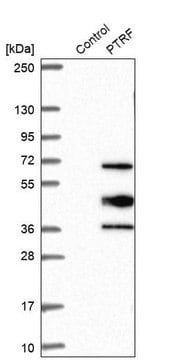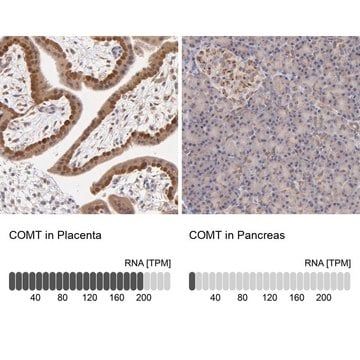ZRB1996
Anti-ACLY Antibody, clone 1B16 ZooMAb® Rabbit Monoclonal
recombinant, expressed in HEK 293 cells
Manufacturer: Sigma Aldrich
Synonym(S): ATP-citrate synthase;EC:2.3.3.8;ATP-citrate (pro-S-)-lyase;ACL;Citrate cleavage enzyme
Select a Size
| Pack Size | SKU | Availability | Price |
|---|---|---|---|
| 25 μL | ZRB1996-25-μL | In Stock | ₹ 20,800.00 |
| 4 X 25 μL | ZRB1996-4-X-25-μL | In Stock | ₹ 49,479.36 |
ZRB1996 - 25 μL
In Stock
Quantity
1
Base Price: ₹ 20,800.00
GST (18%): ₹ 3,744.00
Total Price: ₹ 24,544.00
biological source
rabbit
Quality Level
200
recombinant
expressed in HEK 293 cells
conjugate
unconjugated
antibody form
purified antibody
antibody product type
primary antibodies
clone
1B16, recombinant monoclonal
description
1B16 Clone
product line
ZooMAb® learn more
form
lyophilized
Description
- General description: We are committed to bringing you greener alternative products, which adhere to one or more of The 12 Principles of Green Chemistry.This antibody is Preservative-free, produced without the harm or sacrifice of animals and exceptionally stable to allow for ambient shipping and storage if needed and thus aligns with "Waste Prevention", "Designing Safer Chemicals" and "Design for Energy Efficiency". Click here for more information.
- Specificity: Clone 1B16 is a ZooMAb® Rabbit recombinant monoclonal antibody that specifically detects ATP citrate synthase (ACLY). It targets an epitope within 20 amino acids from the C-terminal region.
- Immunogen: KLH-conjugated linear peptide corresponding to 20 amino acids from the C-terminal region of human ATP-citrate synthase (ACLY).
- Application: Quality Control TestingEvaluated by Western Blotting in NIH3T3 cell lysate.Western Blotting Analysis: A 1:1,000 dilution of this antibody detected ACLY in NIH3T3 cell lysate.Tested ApplicationsWestern Blotting Analysis: A 1:1,000 dilution from a representative lot detected ACLY in lysates from Raji cells and Rat brain tissue.Immunohistochemistry (Paraffin) Analysis: A 1:1,000 dilution from a representative lot detected ACLY in human pancreas tissue sections.Immunocytochemistry Analysis: A 1:100 dilution from a representative lot detected ACLY in U2OS cells.Affinity Binding Assay: A representative lot of this antibody bound ATP Citrate Synthase (ACLY) peptide with a KD of 5.5 x 10-8 in an affinity binding assay.Note: Actual optimal working dilutions must be determined by end user as specimens, and experimental conditions may vary with the end user.
- Target description: ATP-citrate synthase (UniProt: P53396; also known as EC:2.3.3.8, ATP-citrate (pro-S-)-lyase, ACL, Citrate cleavage enzyme ACLY) is encoded by the ACLY gene (Gene ID: 47) in human. ACLY is a homotetrameric enzyme that catalyzes the conversion of mitochondrial citrate into oxaloacetate and acetyl-CoA. This step is a major source of cytosolic acetyl-CoA that is used in the biosynthetic pathways of fatty acids, cholesterol, and acetylcholine. ACLY is strongly expressed in liver, adipose tissue, and cholinergic neurons. Its activity is stimulated by glucose 6-phosphate, fructose 6-phosphate, fructose 2,6-bisphosphate, and fructose 1,6-bisphosphate. ACLY is phosphorylated by PKA and GSK3 in a sequential manner, which results in its activation. Phosphorylation on threonine 447 and serine 451 by GSK3 is reported to depend on the phosphorylation of serine 455 by PKA. ACLY also undergoes acetylation at lysine 540, 546, and 554 by lysine aetyltransferase 2B ( KAT2B/PCAF). These acetylations are promoted by glucose and lead to its stabilization, probably by inhibiting ubiquitination at these sites. Overexpression of ACLY has been reported many lipogenic tumors, including prostate, liver, breast, and ovarian cancers. This ZooMAb® recombinant monoclonal antibody, generated by our propriety technology, offers significantly enhanced specificity, affinity, reproducibility, and stability over conventional monoclonals. (Ref.: Verschueren, KHG., et al. (2019). Nature. 568; 571-575; Lin, R. et al. (2013). Mol Cell. 51(4); 506-518; Potapova, IA., et al. (2000). Biochemistry. 39(5); 1169-1179).
- Physical form: Purified recombinant rabbit monoclonal antibody IgG, lyophilized in PBS with 5% Trehalose, normal appearance a coarse or translucent resin. The PBS/trehalose components in the ZooMAb formulation can have the appearance of a semi-solid (bead like gel) after lyophilization. This is a normal phenomenon. Please follow the recommended reconstitution procedure in the data sheet to dissolve the semi-solid, bead-like, gel-appearing material. The resulting antibody solution is completely stable and functional as proven by full functional testing. Contains no biocide or preservatives, such as azide, or any animal by-products. Larger pack sizes provided as multiples of 25 μL.
- Reconstitution: 300 μg/mL after reconstitution at 25 μL per vial. Please refer to guidance on suggested starting dilutions and/or titers per application and sample type.
- Storage and Stability: Recommend storage of lyophilized product at 2-8°C; Before reconstitution, micro-centrifuge vials briefly to spin down material to bottom of the vial; Reconstitute each vial by adding 25 μL of filtered lab grade water or PBS; Reconstituted antibodies can be stored at 2-8°C, or -20°C for long term storage. Avoid repeated freeze-thaws.
- Legal Information: ZooMAb is a registered trademark of Merck KGaA, Darmstadt, Germany
- Disclaimer: Unless otherwise stated in our catalog or other company documentation accompanying the product(s), our products are intended for research use only and are not to be used for any other purpose, which includes but is not limited to, unauthorized commercial uses, in vitro diagnostic uses, ex vivo or in vivo therapeutic uses or any type of consumption or application to humans or animals.
SAFETY INFORMATION
WGK
WGK 1
Flash Point(F)
Not applicable
Flash Point(C)
Not applicable





